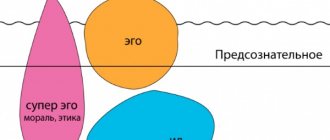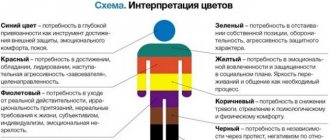Defense mechanisms are forms of mental defense that protect a person from strong experiences and traumatic events, and associated anxiety.
These are peculiar adaptation mechanisms that allow the inner self to regulate the impact of the environment and society, transferring negative experiences to the area of the unconscious.
This behavior helps a person relieve oppressive anxiety that arises in response to problems that he cannot solve. This could be the loss of a loved one, loss of self-esteem, or traumatic memories.
It is natural that most of these mechanisms are formed in childhood, when the child really cannot solve his problems in another, rational way. And there is even a positive side to this - the psyche stabilizes and becomes less vulnerable to negative experiences. However, over time, protection becomes an obstacle to development and personal growth; a person moves more and more away from reality, loses the objectivity of judgment, and engages in self-deception.
Characteristics common to all defense mechanisms:
- the action occurs on an unconscious level and is automatic;
- the result is a distorted perception of reality.
crowding out
The process of suppressing and repressing into the unconscious mind those experiences, thoughts and desires that bring feelings of guilt and shame, cause stress, pain or suffering.
This manifests itself in forgetting unpleasant responsibilities, certain memories, or incidents. However, these repressed events and feelings do not disappear. They appear to a person in the form of dreams, slips of the tongue or jokes. To contain these breakthroughs, the psyche spends a lot of energy, which leads to depletion of resources and the emergence of neuroses and psychosomatic disorders.
Freud believed this mechanism to be the primary defense against anxiety, which can serve as the basis for the formation of other types of defenses.
Fantasizing.
Fantasizing is avoiding problems through fantasy, isolating oneself from reality: from daydreaming to reading literature and watching porn. We use it to transport ourselves from a world that threatens us in order to find comfort elsewhere.
Preview: Sigmund Freud in his office in Vienna with his daughter Anna, 1937. The photograph was taken by Princess Eugenie of Greece, daughter of Marie Bonaparte.
See also:
- Carl Jung: Tarot cards as a path to the unconscious
- Sigmund Freud Speaks: The Only Recording of the Voice of the Founder of Psychoanalysis (1938)
- “Imperfection is the only thing that makes us unique.” Brene Brown on shame and vulnerability
- Video interview with Carl Jung: why it is necessary to study the psyche, what a person cannot put up with and where is the source of evil
July 6, 2018
Projection
It involves attributing one's own thoughts, behavior and experiences to other people or entire communities. This is what an individual considers unacceptable as a result of upbringing or shifting the blame to others for his mistakes and failures.
A person refuses to accept certain character traits or feelings, such as envy, anger and hypocrisy, and blames others for them. Thus, he protects himself from awareness of his problems or shortcomings and shifts responsibility for his actions onto others.
For example, a person may accuse society of injustice and cruelty, which, in turn, justifies the same attitude towards others, since “that’s the way the world is.” Or condemn people for their perverted desires, see dirty hints in every event.
The phenomenon of projection turns people into convenient targets for aggression and underlies all kinds of prejudices, social stereotypes and racial intolerance.
In practice, it occurs as often as the displacement mechanism.
Definition of psychological protection of the individual in psychology
The mechanisms of psychological defense of the individual began to be studied by S. Freud and were intensively studied by foreign and domestic psychologists. Psychological defense is a set of mental mechanisms, actions and methods aimed at reducing or eliminating causes that threaten the integrity and stability of a person, his “I”.
This mechanism unconsciously distorts the perception of reality and contributes to the creation of a more favorable image of it and one’s own. As a result of such distortion, the contradiction is softened and the intrapersonal conflict is removed or smoothed out. Psychological protection allows you to maintain the stability of personal self-esteem and self-image, avoiding an unpleasant and traumatic situation.
The main role of this mechanism is to create a balance between the individual and the outside world, reducing anxiety associated with subjective interpsychic conflict.
Substitution
The process by which negative emotions are redirected to a safer, from the individual's point of view, object for reaction. The husband, who is bullied by his superiors at work, lashes out at his wife and children at home. A child, having received a beating from his parents, breaks toys or hits a pet.
Or, as an option, auto-aggression occurs, which manifests itself in self-blame and self-flagellation, and can develop into depression.
The point is that the true object for the outburst of indignation is replaced by a less threatening one. Substitution also manifests itself in high irritability and sensitivity.
Auto-aggression: blaming yourself
Auto-aggression, or turning against oneself, is a very destructive defense mechanism. It is often characteristic of children experiencing difficult moments in their relationships with their parents. A person may have a hard time accepting that their parent is being dismissive or aggressive towards them, and instead assume that they are the bad ones. Self-blame, self-deprecation, self-harm, self-destruction through drugs or alcohol, and overindulgence in the dangerous aspects of extreme sports are all results of this mechanism.
Auto-aggression occurs most often when our survival or well-being depends on the external object that caused its appearance. But despite the many negative consequences of this process, from an emotional point of view it can be better tolerated than aggression directed at the original target: a parent, guardian or other important figure.
Rationalization
Explain your irrational behavior with reasonable reasons. Rationalization helps justify your mistakes and misdeeds in the eyes of others. This mechanism serves, first of all, to preserve and protect self-esteem. Let's say a student who fails a session explains this by saying that he doesn't really want to study in his specialty.
Rationalization also helps to cope with frustration by providing explanations for those actions of people that can cause pain and suffering if understood correctly. For example, a rejected man explains his failure by saying that the woman is stupid and ugly.
This mechanism extinguishes anxiety and helps to find arguments and logic in one’s own unacceptable behavior or desires.
Summarizing
Despite all its complexity and confusion, the model of defense mechanisms by Plutchik, Kellerman and Conte can be a good practical tool for greater awareness and effectiveness in life. We invite you to once again go through the list of possible psychological defenses and answer the questions:
- What defense mechanisms have you noticed in yourself?
- Is there one among them that you use more often than others?
- Which of these reactions do you find difficult to control and be aware of when you resort to them?
- And most importantly, what other ways to cope with unpleasant events, feelings or your shortcomings are there? How else can you react and behave? What approach or behavior will be most effective and beneficial in the long term?
The more aware you are of your unconscious psychological defenses, the less they control you and are automatic. This way, it is possible not only to choose the most optimal behavior, but also to become the master of your reactions and your life. If you are interested in developing the skills of awareness and management of your emotions, we draw your attention to the online program “Mental Self-Regulation”. This course teaches the ability to control and harmonize your mental states, which improves your quality of life.
We wish you good luck!
We also recommend reading:
- Storytelling
- Freudian slip: the hidden meaning of involuntary substitution of words
- Fear: psychological foundations and famous scientific studies of this phenomenon
- Robert Plutchik's Theory of Emotions
- Sublimation in psychology
- Intelligence: definition, development and degradation
- Defense mechanisms of the psyche
- Behavioral mechanisms
- Hakomi Therapy
- Reframing Your Dark Side
- How to manage anger?
Key words: 1Cognitive science, 1Psychoregulation
Reactive education
A complex two-level defense mechanism, which, in general, consists in the fact that a person behaves directly opposite to the repressed unconscious aspiration. For example, a mother who does not love her child takes excessive care of him.
- At stage 1, forbidden feelings and experiences are suppressed;
- At stage 2, a hypertrophied opposite feeling arises.
Thus, the psyche is protected from socially unacceptable impulses and drives. The opposite effect occurs. The classic case for explaining this phenomenon is active and public homophobia, which is the result of one's own repressed tendencies.
Conditions that trigger protection
The mechanisms of psychological defense of the individual are not formed at the level of the main regulator of human behavior - consciousness. Freud scientifically substantiated the existence of a deep level of the unconscious, filled with aspirations, drives and desires.
Freud realized that unconscious experiences significantly influence a person’s life and behavior, and also become the cause of neuropsychiatric diseases.
To understand the nature of the emergence of defense mechanisms, it is necessary to determine the structure of the human psyche:
- Id (“It”). Innate human aspirations, instinctive and irrational impulses of the psyche.
- Superego (“Super-ego”). The highest system of human values, acquired by him in the process of mastering the rules of behavior and social norms
- Ego (“I”). The part of the personality responsible for making decisions appears only as a result of the conflict between the Id and the Superego.
According to this theory, the Ego (“I”) tries to control the impulses of the “It.” At the same time, the Ego tries to come to terms with the Superego and its norms and taboos. The main conflict occurs between innate aspirations (Id) and the higher value system (Superego).
The ego reduces anxiety by working by channeling negative impulses into behavior that is positive and socially satisfying. In this, a person is helped by mental defenses, which vary depending on the situation and the severity of internal personal contradictions.
Regression
A mechanism to avoid fear and anxiety by returning to earlier, childhood patterns of behavior. Arises as a reaction to traumatic situations and experiences.
The regression mechanism involves more primitive forms of thinking and responding. It is not for nothing that childhood is considered the safest and most enjoyable period for a person. The person begins to sulk, become stubborn, instead of solving the problem, does not restrain emotional reactions, and denies reasoned opinions and facts. In behavior, this can manifest itself in the fact that a person begins to bite his nails, or watch children's films and cartoons.
It is believed that such a defensive reaction is characteristic of infantile people. However, even mentally mature and mature individuals can fall into regression in situations of strong emotional and mental overload.
Functions of protective mechanisms
- They help minimize the consequences of intrapersonal conflict. That is, when a contradictory struggle arises between norms of behavior and desires. For example, the most banal thing is when you need to protect yourself and win, but the law and the Bible say “thou shalt not kill.”
- Minimize the experience of negative feelings and help cope with them.
- They relieve tension so that the psyche remains intact. If there is excessive anxiety or if the person is not mature, these mechanisms may not cope. In this case, neurosis occurs, sometimes depression and destruction, personality degradation. You can read about degradation here.
- Sometimes they unnecessarily distort reality, as a result of which a person behaves inappropriately, not constructively and sometimes unsafely.
Negation
It consists of denying reality or some events. It is considered a certain kind of “childish” reaction, because obvious evidence and arguments, contradictions in logic are ignored. It is typical for children; in adulthood it manifests itself as a reaction to complex traumatic events.
For example, a person may deny committing a crime if he was drunk and did not realize what was happening. Or the mother may refuse to believe that the child is dead until the very end.
Also, denial is the first stage of experiencing grief, and often, a person is unable to move to another level of awareness of the loss and returns to denial again and again.
Denial saves a person from the initial shock, giving time to gradually get used to what happened. But you can’t stay in this state for long.
general information
Psychoanalysis is one of the directions in psychology, founded by Sigmund Freud; it was he who introduced the concept of defense mechanisms into use, believing that this is a way for the psyche to protect itself from stress.
If we didn’t have this kind of self-defense, we would all suffer from neuroses. They are acquired, usually in childhood; the child, observing the type of reaction of adults to various stimuli, adopts them, because he believes that this is how to behave correctly and necessary. In this way he socializes, even without being able to speak. He will “absorb everything like a sponge” and, of course, repeat it in the future.
Children are not as stupid as they seem at first glance; they are able to “read” information, even if it is carefully guarded. They know how to feel, they cannot and do not know only how to deal with it later. And if parents were “stuck” on one mechanism, or used them too often, then you shouldn’t be surprised that their child, already an adult, will have similar behavior and problems.
Sublimation
The only one of all defenses that is considered positive and constructive. It allows you to redirect unrealized internal energy into creativity or other socially acceptable activities. For example, a person can find a way out of internal anxiety by cleaning the house, playing sports, playing music or drawing.
Even the choice of profession can be determined by suppressed instinctual impulses. An aggressive young man will take up football or hockey, a woman with sadistic tendencies will become a surgeon.
According to Freud himself, sublimation served as the basis for the great achievements of civilization, the development of culture, art and science.
Today there are tests, for example, the Lazarus test, that allow you to identify specific existing defense mechanisms. Having identified 2-3 basic mechanisms, you can gain control over them using coping strategies.
If you find an error, please select a piece of text and press Ctrl+Enter.
7. Intellectualization.
This defense mechanism involves an exaggerated use of intellectual resources in order to eliminate emotional experiences and feelings. Intellectualization is closely related to rationalization and replaces the experience of feelings with thinking about them (for example, instead of real love, talk about love).
8. Compensation
.
It is an unconscious attempt to overcome real or imagined shortcomings. This mechanism develops during the formation of the basic structures of the psyche as the latest defense mechanism. It is usually used consciously and is intended to contain the emotions of sadness, grief over a loss, or fear of loss. It is realized through persistent work on oneself, self-improvement, through the desire to achieve significant results in the types of activities chosen for this.
Compensatory behavior is universal because achieving status is an important need for almost all people. Compensation can be socially acceptable (a blind person becomes a famous musician) and unacceptable (compensation for short stature is a desire for power and aggressiveness; compensation for disability is rudeness and conflict). They also distinguish between direct compensation (the desire for success in an obviously losing area) and indirect compensation (the desire to establish oneself in another area).
9. Reactive formations
.
This protective mechanism replaces impulses, desires and feelings (especially sexual and aggressive) that are unacceptable to awareness by developing and emphasizing the opposite attitude or behavior. The development of this defense mechanism is associated with a person’s assimilation of “highest social (moral) values.” Reactive education develops to contain the emotion of joy in possessing a certain valuable object (for example, one’s own body) and the possibilities of using it (in particular, for sex and aggression). This mechanism presupposes the implementation in behavior of the exact opposite attitude (in particular, emphasized strictness of morals, even hypocrisy, deliberate modesty, emphasized care and mercy, etc.).
The protection is two-stage. First, the unacceptable desire is repressed, and then its antithesis is strengthened. For example, exaggerated protectiveness may mask feelings of rejection, exaggerated sweetness and politeness may mask hostility, etc.





